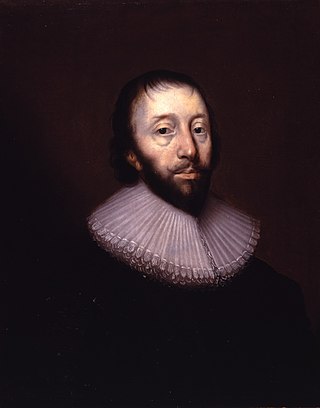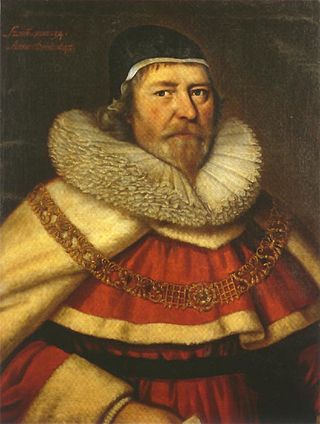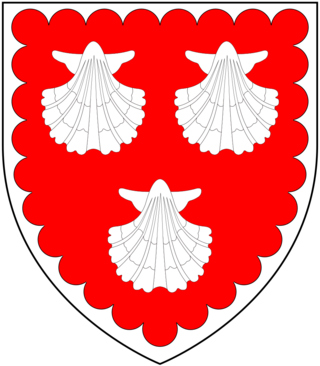Related Research Articles

James Ley, 1st Earl of Marlborough was an English judge and politician who sat in the House of Commons at various times between 1597 and 1622. He was Lord Chief Justice of the King's Bench in Ireland and then in England, and was Lord High Treasurer from 1624 to 1628. On 31 December 1624, James I created him Baron Ley, of Ley in the County of Devon, and on 5 February 1626, Charles I created him Earl of Marlborough. Both titles became extinct upon the death of the 4th Earl of Marlborough in 1679.

Sir Dudley Digges was an English diplomat and politician who sat in the House of Commons between 1610 and 1629. Digges was also a "Virginia adventurer," an investor who ventured his capital in the Virginia Company of London; his son Edward Digges would go on to be Governor of Virginia. Dudley Digges was responsible for the rebuilding of Chilham Castle, completed in around 1616.

Sir John Bankes was an English lawyer and politician who sat in the House of Commons between 1624 and 1629. He was Attorney General and Chief Justice to Charles I during the English Civil War. Corfe Castle, his family seat was destroyed during a long siege, in which his wife Mary Hawtrey became known as Brave Dame Mary.

Sir Edward Barrett, 1st Lord Barrett of Newburgh,, Bt, was an English politician.

Sir John Glanville the younger, was an English politician who sat in the House of Commons at various times between 1614 and 1644. He was Speaker of the English House of Commons during the Short Parliament. He supported the Royalist cause in the English Civil War.
Sir Lawrence Hyde II was an English lawyer who was Attorney-general to the consort of King James I, Anne of Denmark. He sat in the House of Commons at various times between the years 1584 and 1611.
Sir John Jacob, 1st Baronet of Bromley, was an English politician who sat in the House of Commons in 1640 and 1641. He supported the Royalist side in the English Civil War.
John Bulkeley was an English politician who sat in the House of Commons at various times between 1640 and 1662.
Sir Edward Bayntun was an English politician who sat in the House of Commons variously between 1640 and 1679.
William Brisco was an English lawyer and politician who sat in the House of Commons between 1654 and 1660.
Henry Eyre was an English lawyer and politician who sat in the House of Commons at various times between 1659 and 1678.
Henry Hungerford was an English politician who sat in the House of Commons variously between 1645 and 1660,
John Hungerford was an English politician who sat in the House of Commons at various times between 1597 and 1611.

Christopher Erle was an English lawyer and politician who sat in the House of Commons at various times between 1621 and 1629.
Sir John Ferrers (1566–1633) was an English landowner and politician who sat in the House of Commons at various times between 1586 and 1611.
Richard Taylor was an English politician who sat in the House of Commons from 1661 to 1667. He supported the Royalist cause in the English Civil War.
Thomas Lambert (1585–1638) was an English landowner who briefly sat in the House of Commons from 1625 to 1626.
Sir John Tyrell (1597–1676) was an English landowner and politician who sat in the House of Commons from 1661 to 1676.

John Strangways was an English politician who sat in the House of Commons from 1661 to 1676.
Sir Thomas Estcourt (c1645–1702) of Pinkney, near Sherston in Wiltshire, was an English landowner and politician.